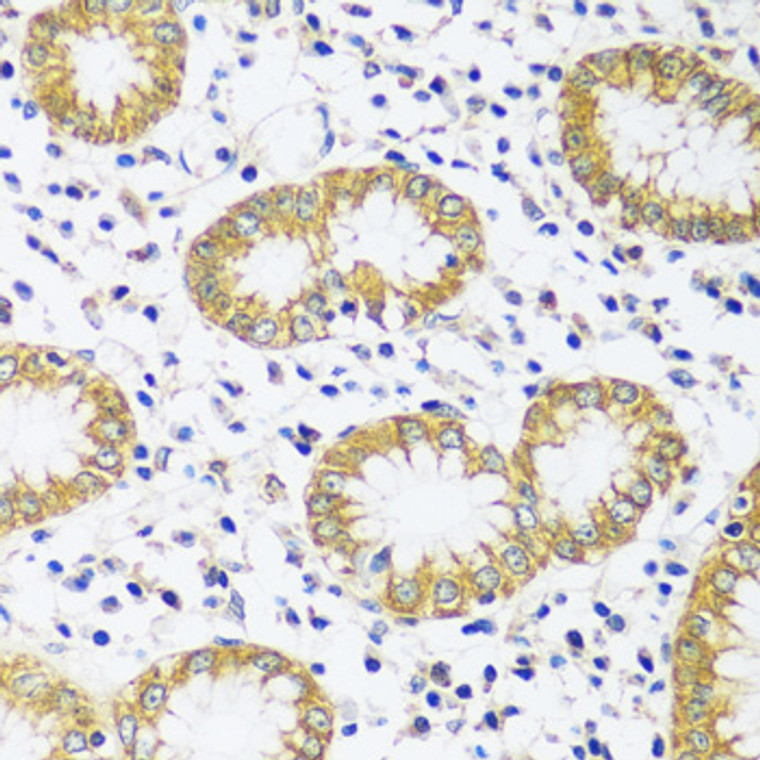| Host: |
Rabbit |
| Applications: |
IHC |
| Reactivity: |
Human |
| Note: |
STRICTLY FOR FURTHER SCIENTIFIC RESEARCH USE ONLY (RUO). MUST NOT TO BE USED IN DIAGNOSTIC OR THERAPEUTIC APPLICATIONS. |
| Short Description: |
Rabbit polyclonal antibody anti-CADPS (1020-1100) is suitable for use in Immunohistochemistry research applications. |
| Clonality: |
Polyclonal |
| Conjugation: |
Unconjugated |
| Isotype: |
IgG |
| Formulation: |
PBS with 0.01% Thimerosal, 50% Glycerol, pH7.3. |
| Purification: |
Affinity purification |
| Dilution Range: |
IHC-P 1:50-1:200 |
| Storage Instruction: |
Store at-20°C for up to 1 year from the date of receipt, and avoid repeat freeze-thaw cycles. |
| Gene Symbol: |
CADPS |
| Gene ID: |
8618 |
| Uniprot ID: |
CAPS1_HUMAN |
| Immunogen Region: |
1020-1100 |
| Immunogen: |
Recombinant fusion protein containing a sequence corresponding to amino acids 1020-1100 of human CADPS (NP_899630.1). |
| Immunogen Sequence: |
MASDMIESCVKRTRIAFEVK LQKTSRSTDFRVPQSICTMF NVMVDAKAQSTKLCSMEMGQ EHQYHSKIDELIEETVKEMI T |
| Tissue Specificity | Specifically expressed in neural and endocrine secretory tissues. Expressed in brain and pancreas and at low level in heart. Also expressed in fetal heart, cerebellum, cerebral cortex, medulla, occipital pole, frontal and temporal lobes, and putamen, as well as weak expression in spinal cord. |
| Function | Calcium-binding protein involved in exocytosis of vesicles filled with neurotransmitters and neuropeptides. Probably acts upstream of fusion in the biogenesis or maintenance of mature secretory vesicles. Regulates catecholamine loading of DCVs. May specifically mediate the Ca(2+)-dependent exocytosis of large dense-core vesicles (DCVs) and other dense-core vesicles by acting as a PtdIns(4,5)P2-binding protein that acts at prefusion step following ATP-dependent priming and participates in DCVs-membrane fusion. However, it may also participate in small clear synaptic vesicles (SVs) exocytosis and it is unclear whether its function is related to Ca(2+) triggering. |
| Protein Name | Calcium-Dependent Secretion Activator 1Calcium-Dependent Activator Protein For Secretion 1Caps-1 |
| Cellular Localisation | SynapseCytoplasmic VesicleSecretory VesicleNeuronal Dense Core Vesicle MembranePeripheral Membrane ProteinMembrane-Associated To VesiclesStrongly Enriched In Synaptic FractionsPreferentially Binds To Dense Core Vesicles But Not To Synaptic VesiclesBinds PhosphoinosidesWith A Strong Selectivity For Ptdins(45)P2 Over Ptdins(345)P3Probably Localizes To Different Vesicles Compared To Cadps2 |
| Alternative Antibody Names | Anti-Calcium-Dependent Secretion Activator 1 antibodyAnti-Calcium-Dependent Activator Protein For Secretion 1 antibodyAnti-Caps-1 antibodyAnti-CADPS antibodyAnti-CAPS antibodyAnti-CAPS1 antibodyAnti-KIAA1121 antibody |
Information sourced from Uniprot.org
12 months for antibodies. 6 months for ELISA Kits. Please see website T&Cs for further guidance








